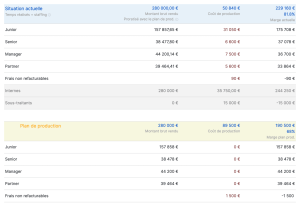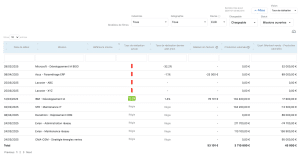How to estimate the costs of a project?

Before any project is launched, it is essential to know how much it will cost. The project cost estimate then comes into play: it allows you to define whether the project is likely to be profitable, and articulates the different phases in such a way as to stay within budget.
However, this exercise is far from easy; it requires rigour, experience and methods. So, the dedicated features of project management tools prove to be valuable.
In this article, we offer you a clear and actionable guide to understand the challenges of a fair estimate and to help you determine project costs as accurately as possible.
Why is Project Cost Estimation So Important?
Project Cost Estimation: Definition
Estimating the cost of a project consists of calculating all the costs necessary to carry out the project. This practice helps identify all the financial resources you'll need to complete the project on a specific schedule and budget.
The project manager, in charge of this mission, must take into account the scope, deadlines and risks to establish an estimate that is as realistic as possible. However, this is an iterative process. The overall cost estimate of a project should be updated according to new information available.
The Importance of Cost Estimating in a Project's Success
Estimating costs in a project is strategic. Indeed, it makes it possible to determine whether the project deserves to be launched in view of its economic stakes, and to assess its chances of profitability.
When the project is finally considered, cost estimating helps to obtain reliable forecasts and optimizes expense management to avoid overruns.
What Are Cost Estimating Stakes and Challenges?
The Key Objectives of Estimating the Value of a Project
Estimating the costs of a project serves several purposes.
One of them is to avoid cost drifts, as respect for the budget is considered one of the first evaluation criteria to evaluate the performance of a project.
Then, making the project cost estimate realistically allows you to make a relevant offer to your client. Avoid overvaluing the budget that could scare them, as well as undervaluing. Indeed, the latter would make it difficult for you to meet your commitments while staying within your forecasts.
Anticipating and Managing the Unexpected
Offering an accurate estimate is one of the major difficulties in estimating project costs. Indeed, this implies taking risks into account and anticipating them
to provide credible financial planning.
Identify any risk that could impact your project and its costs: delays in subcontractors, poor communication, perimeter drift, etc. It is therefore essential to provide room for manoeuvre. Also known as "provisions", it makes it possible to make up for delays or make up for errors.
With rigor and careful risk management, you will be able to provide a realistic project cost estimate, minimizing the risk of deviations.
Cost estimation: a strategic issue for the project manager
The project manager is responsible for the cost estimate, which partly determines the overall success of the project.
Thus, three essential conditions must be met to guarantee this success:
- precision: for a reliable estimate, efficient management and a controlled budget,
- credibility: of the project manager, his team and the company, which is based on the accuracy of the forecasts,
- Profitability: A successful project must meet its financial goals. Without this, its legitimacy could have been called into question from the validation phase.
How To Determine The Cost of a Project?
Costs Estimation According to the Billing Method
The project cost estimate will largely depend on the billing method applied.
Agencies IT Services and consulting firms use different methods depending on the context:
- flat-rate, where the budget is fixed, and the budget estimate is closely linked to the resource planning established in the preparation phase,
- in the time and control room, where the WJC is defined according to seniority. Invoicing is based on time spent,
- in agile, which requires an iterative approach because no two sprints are alike. Invoicing is made complex.
Thus, the technique for estimating the costs of a project should be chosen according to the billing method and the context.
Project Costs Estimation Methods
Project cost estimating remains a balance to be found between cost, scope and deadline. As mentioned in the project specification guide, any modification of one impacts the others and needs to be adjusted. Perimeter drifts jeopardize the project.
Although project costing is relatively complex, careful data collection and the right choice of methods will help you lay the foundation for a realistic estimate.
- Top-down estimation
This method of estimating the costs of a project starts from an overall estimate, often defined from experience or a target budget.
This overall cost is divided between the different major phases and tasks of the project. In addition, the to-do list also helps to establish the project schedule.
This method is quick to implement, but is still based on assumptions. It is preferred when the information available is still not very precise.
Relying on a project management tool at this stage can be a great help. Stafiz allows you to divide your project into phases and to precisely track the time and costs associated with each one.
- Bottom-up estimation
The opposite approach is taken here: you define the cost of each task to get an overall cost estimate. You can rely on accurate data collected from different teams and stakeholders.
- Three-point estimation
This technique consists of averaging three pieces of data:
- best estimate,
- the most optimistic estimate,
- the most pessimistic estimate.
- Analog or comparative estimation
The analogue estimation method is based on history. By comparing the current project to a past project, you get an overall cost estimate. Although fast, this method is not very precise.
The so-called "parametric" method is also based on history, but takes more into account the differences between the current project and the model project.
- Expert Judgement
This cost estimate is based on an individual's experience and intuition. It therefore calls on the expertise of the latter, as well as on the information collected from the teams.
More random, this method can however be effective depending on the expert's experience.
A combination of several methods can be a good idea to refine your estimate. The creation of scenarios, such as the scenario builder proposed by Stafiz, accompanies you in this exercise. This allows you to generate different scenarios from a production plan, varying parameters such as placement margins.

Create your project, allocate resources, and state your goals. Our scenario builder offers you the best planning alternative to reduce your costs as much as possible.
Costs to consider when calculating your project budget
The main costs to consider when making your estimate are related to fees, purchases, and subcontracting. Generally, there are two categories of costs.
- Direct costs, which are specific to the project. These are usually the salaries of the team and subcontractors, services, or emergency costs such as penalties, resignations and training.
- Indirect costs, related to the operation of the company. Thus, we account for rents, equipment, hardware, software, licenses, salaries of other departments of the company (marketing, accounting, HR, etc.).
Evaluate and account for all of these costs to get an estimate of your cost of production. To this must be added the margin and provisions, intended to make up for the risks.
Improve Costs Estimation Accuracy
Note that it's normal to revise your cost estimates during the project. The closer the phase you are working on, the more accurate the estimate becomes. Called wave planning, this mode of operation helps to gain precision.
Using a tool to estimate the costs of a project can also help you with this process. Project cost estimating and management software such as Stafiz allows you to obtain a macro and micro view of the schedule, deadlines, budget and resources. With real-time visibility, you rely on reliable data. With adjustment features, you can be both reactive and proactive.
- Readjust the budget based on the monitoring of costs and margins
Stafiz allows profitability reporting to track margins and adjust budgets accordingly. This way, you optimize profitability in real time. In the event of a deviation, you are free to try to renegotiate or to place other employees.
- Relying on history
Closing data is a valuable source of information, providing a solid basis for estimating future costs more accurately.
Indeed, you will be able to learn a lot about how expenses have been managed by analyzing previous projects : time spent, resources used, or possible overruns...

Viewing the performance of a project in Stafiz
To change your daily costs and analyze past projects in the light of these new costs, Stafiz allows you to do this retroactively and analyze your past projects on updated costs.

Project-by-project vision to analyze projects that have deviated from costs by industry, customers
4 Mistakes To Avoid For a Reliable Cost Estimation
Here are four mistakes to avoid to build an optimal project cost estimate.
- Undercipher or overencrypt
As mentioned earlier, both could cause you harm, either by scaring your prospect or by complicating your financial planning. If the client's budget isn't aligned with what you can offer, back off.
- Not giving visibility
Offer intermediate steps to the customer to reassure them and make sure that the expenses are in line with the estimate.
- Not tracking costs
Keeping track of your project and especially its expenses is essential to ensure that everything goes according to plan. If the budget is exceeded, there is still time to rectify it.
- Not having your proposal validated internally
Check out your company's other departments before sending your proposal to the customer. Indeed, you work with profitability objectives, the project you are in charge of must meet strategic challenges.
Estimating project costs reliably and accurately is essential for a successful project.
Without this, the project might never even see the light of day. This exercise remains essential to the profitability of the project, but also impacts the reputation of the company as a whole.
Fortunately, there are several proven methods of estimation: bottom-up, top-down or analogy, they can be combined for maximum accuracy. Thus, project cost estimating must be fully integrated into your project management, improving profitability as well as risk management, thus ensuring the success of the project.
Questions:
The cost of a project is the sum of all the direct and indirect costs incurred to carry it out.
Direct costs include project team salaries, subcontractors, purchases, and specific expenses.
Indirect costs include structural costs: rent, software, support functions (HR, marketing, accounting, etc.).
In addition, there is usually a margin and provisions for risks.
- Bottom-up estimation : very reliable, it consists of estimating the cost of each task, then aggregating them.
- Three-point estimate : calculates a weighted average between an optimistic, pessimistic and realistic estimate.
- The combination of methods : cross-referencing bottom-up, analogical and expert judgement approaches increases accuracy.
- Scenario creation : based on real data, this method simulates different cases to refine the estimates.
The best tools allow you to model costs, track variances in real time, and simulate budget scenarios.
Many start with Excel, but specialized tools like Stafiz allow you to automate estimates and financial monitoring, with more precision.


